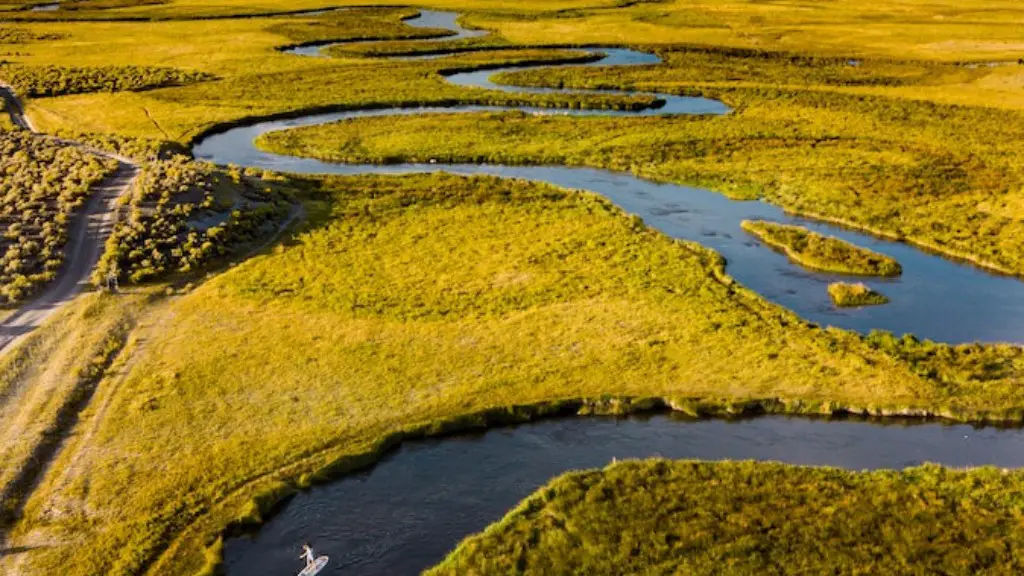Theme in Huckleberry Finn
At the beginning of Mark Twain’s novel,Huckleberry Finn, the protagonist, Huck, escapes his oppressive life with the Widow Douglas by setting off down the Mississippi River with his companion, Jim. Throughout the novel, the Mississippi River serves as both a physical and symbolic escape from the repression of society, thereby representing freedom to both Huck and Jim.
The textual references of the Mississippi River in Huckleberry Finn indicate a representation of freedom. The current of the river serves a fitting metaphor for the progress of Huck and Jim towards their newfound liberty. In the same way that Huck and Jim can use the physical movement of the river to progress along the timeline of the novel, they can also use it to move away from the bondage of their past and further along the path of their own freedom.
Huck and Jim find respite and comfort in their encounters along the Mississippi River. It is often an opportunity for them to pause and reflect as they experience different levels of freedom and autonomy. Twain describes the river: “You feel mighty free and easy and comfortable on a raft”(1945, Twain). The open expanses of the river appear to erase any kind of hierarchical status of power among Huck and Jim and exclude them from the demands of society. Their escape from the rigidity of the Widows’ domain and into the open water of the Mississippi serves as a physical and symbolic representation of their freedom.
The Mississippi River in Huckleberry Finn is a symbol of freedom and escape, a respite both from the physical and moral laws of society, allowing Huck and Jim to reconnect with nature and experience life and freedom away from the constraints of civilization. Both characters use the river as a means of self-discovery and exploration, learning valuable lessons as they travel. This idea of freedom is ultimately fused with an appreciation of nature and a new understanding of human emotion and morality, ultimately leading to a better, more fulfilling life.
Personal Growth through Freedom
The freedom provided by the Mississippi River is a catalyst for huge amounts of personal growth in both Huck and Jim. The novel begins with Huck’s moral dilemma: to save his friend Jim from slavery or to turn him in and free himself from this burden. Over the course of the novel in many conversations, events, and experiences, Huck develops his moral compass and his sense of identity. Here, the Mississippi River plays a pivotal role in Huck’s personal growth. In his time spent on the river, traveling with Jim, Huck is able to let go of his prejudiced view of others and his former life and appreciate the beauty and freedom of a world outside. He can detach himself from the bind of civilization and enter a more impartial space where he is free to think for himself.
Without the escape of the Mississippi River, Huck’s moral development would not have occurred. While criss-crossing his way down the river, Huck is exposed to many of the injustices present in society from both moral and economic perspectives. He is able to step back and analyze his views and opinions in a completely different light. This newfound perspective not only encourages Huck to confront his own contradictions and prejudices but also to face up to his decisions and their consequences. As a result, he is able to tap into a form of independence both in terms of his thinking and in terms of his actions.
Jim’s experience traveling down the Mississippi is also a reflection of the importance of this space for Huck and himself. Huck gradually sees Jim as an equal by understanding the importance of his freedom, becoming more open minded and learning to forgive. Through their time spent together on the river, Huck and Jim both become aware of their own humanity, making strides towards their own individual freedom and independence despite the oppressive environment they find themselves in. Jim is liberated from his captivity while Huck is liberated mentally and morally.
Impact of Freedom
In Huckleberry Finn, Twain paints a powerful picture of the power of freedom. The Mississippi River serves as a physical manifestation of the freedom that Huck and Jim crave for and ultimately receive. The development of each character’s identity, morality, and individualism is directly correlated with their experiences on the river. The moments of reprieve taken at nighttime
when the two can ponder, free from the constraints of day-to-day society, provide a place of discovery and exploration that is both physical and moral.
In being exposed to new experiences, Huck and Jim begin to further appreciate their own autonomy and freedom. They therefore come to the realization that although they are actively engaging in the act of rebellion against the restrictions of society, their actions are serving as a new form of justice and their escape down the Mississippi is ultimately a pursuit of a higher, more moral existence.
Symbolic Relationship between Huck and Jim
Huckleberry Finn serves as an exploration of the relationship between Huck and Jim, with the Mississippi River acting as the overarching symbol of their companionship. As they travel downriver, their relationship is consistently tested and changed, ultimately culminating in a bond of friendship, trust, and admiration. This further demonstrates the importance of the Mississippi River as the basis for their newfound understanding and freedom.
The close bond between Huck and Jim is signified by the fact that travel down the river is essential for their chances of freedom. They pick up on each other’s struggles and help each other in their pursuit of a more liberating lifestyle. They draw strength from each other’s stamina and support each other in moments of crisis. In spite of their difference in race and status, Twain portrays Huck and Jim as equals who learn to trust and depend on each other, ultimately rising above the boundaries imposed upon them by society.
The aforementioned bond between Huck and Jim is heavily symbolic of the power of freedom. By presenting the Mississippi River as their vehicle for connection, Twain is showcasing the force of the river, its ability to bring people together, and its ability to transcend any boundaries.
Symbolic Relationship between Huck and Society
Huck and Jim’s journey down the Mississippi highlights the extent to which they have devoted themselves to freedom and escape from the oppressive nature of the ideals of society. The protagonists of the novel transcend the expectations and regulations of their society, choosing instead to construct their own, bound together by their commitment to an alternative and more esteemed lifestyle, away from the restrictions of their former lives. The river provides a sense of freedom and autonomy that is primarily sought by Huck, who finds himself confronted with society’s expectations from the beginning of the novel.
As the novel progresses, and Huck and Jim continue to travel downriver, the notion of ‘civilized’ and ‘free’ becomes increasingly blurred. By the end of the novel, Huck discovers the value of a lifestyle that is disconnected from the conventions of civilization. He ultimately chooses to reject his former civilization, opting instead to take his newfound freedom down the river, indicating that freedom and the difference between ‘civilized’ and ‘free’ is a personal issue.
The influence of society on Huck is evident through his general apprehension: he is hesitant to jump into the water out of fear that he will be seen and judged by the townspeople. Huck’s fear of returning to his original status of submission and poverty never disappears, and the Mississippi River serves as a representation of his successful rejection of this form of social justice. This is further emphasized by his intentional disappearance of his tracks so as to leave of any trace of his journey.
Conscious Embrace of Freedom
The Mississippi River in Huckleberry Finn ultimately serves as the color of Huck and Jim’s resolve and their conscious embrace of freedom. As they continue downriver, they become increasingly aware of their respective freedom and responsibility. They develop their own system of justice based on impulse and humane considerations, often rejecting those of the ‘civilized’ world. Freedom for Huck and Jim provides them with the opportunity to free themselves from the prejudices and expectations of society and to construct their own system of morality, one in which they are the judges of their own destinies.
Throughout their journey, Huck and Jim maintain a sense of hope that their journey down the river will lead them to a new form of freedom and justice. The novel focuses heavily on the struggle between the pair’s commitment to freedom and their recognition of their separation from society, marking the river as a physical and symbolic anchor for their liberation. As readers, we observe the transformation of Huck and Jim as they discover the liberation that comes with true freedom and independence.
Conclusion of Freedom Journey
In the end, both Huck and Jim find a sense of resolution in the Mississippi river. Although it is impossible for either to fully escape the implications of a society that judges those escaping it, they are nevertheless able to find a personal freedom that allows them to express their autonomy. This freedom, of course, comes at a price, and both have to struggle against prejudices and expectations at every turn. At the same time, they both find comfort and companionship in each other, and in this way, the Mississippi River is a symbol of their effortless bond.
In the end, the Mississippi River provides the physical and symbolic testament of both Huck and Jim’s freedom. Despite their struggle, the novel emphasizes the power of their commitment to freedom and the companionship that their journey affords them. Ultimately, Huckleberry Finn marks the transition of the two from oppressed subjects of society, to free and independent individuals.




